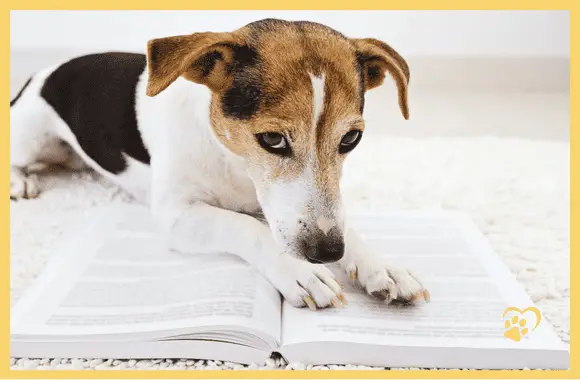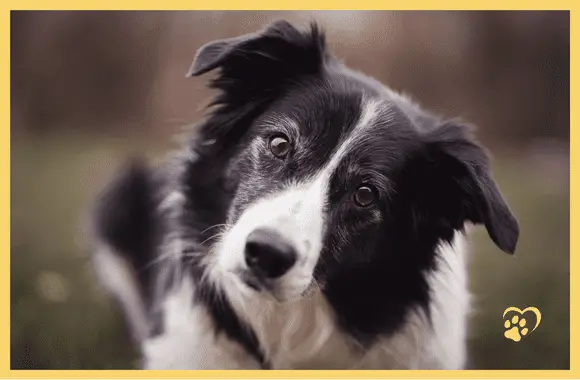Imagine you are walking with your dog in the park and once again he shows you that he understands exactly what you want from him. He is attentive, learns quickly and surprises you again and again with his clever little head. If this sounds like your dream dog, you've come to the right place!
In this blog post, we present you the top 100 most intelligent dog breeds, based on research conducted by American professor and dog psychologist Stanley Coren. Be impressed not only by the list, but also by other findings of the professor.
The study and the 10 smartest dog breeds
Stanley Coren is a psychology professor and author who specializes in canine intelligence. In his book "The Intelligence of Dogs" (new edition 2006), he examines the intelligence of dog breeds and provides a ranking of canine intelligence. Coren divides the intelligence of dogs into three main categories:
- Instinctive intelligence: This type of intelligence refers to a dog's breed-specific abilities, such as herding, retrieving, or tracking.
- Adaptive intelligence: This intelligence includes the dog's ability to solve problems independently and learn from experience.
- Obedience and work intelligence: This refers to a dog's ability to learn and perform tasks set by humans.
Even though the book is over 15 years old, the results still hold true. Coren evaluated over 100 dog breeds for their obedience and working intelligence.
Accordingly, the top 10 most intelligent breeds are:
- Border collie
- Poodle
- German shepherd dog
- Golden Retriever
- Doberman
- Shetland Sheepdog
- Labrador Retriever
- Papillon
- Rottweiler
- Australian Cattle Dog
What does the study say - and what doesn't it say?
This ranking is based on a specific type of intelligence, namely the Obedience and work intelligencethe dog's ability to learn and perform tasks set by humans. In other words, the more docile and obedient a dog is, the higher it appears on the list.
There are many factors that contribute to a dog's intelligence, and some dogs may be particularly gifted in certain areas, even if they are not at the top of Coren's rankings.
What a 3-year-old child does not understand, the dog does not understand either
The best dog is the one that fits one's lifestyle. Intelligent dogs like Border Collies are not suitable for every household because they are very active and need constant activity to avoid becoming neurotic. According to Coren, many of these dogs end up in shelters because their owners can't handle them. An English Bulldog, which is further down the intelligence scale, can easily be left alone for a few hours, while a Doberman can quickly become bored and do damage. A good dose of self-reflection helps to avoid such situations.
Coren's tests show that dogs have the cognitive ability of 2.5- to 3-year-old children. An average dog can understand 165 words, signals or gestures, while particularly intelligent dogs can grasp up to 250 words. Emotions in dogs are similar to those of teenagers. This understanding helps dog owners better understand their animals and predict their behavior. Say to yourself: What a 2 or 3 year old child can't understand, the dog can't understand either.

The whole list
Stanley Coren did not explicitly list the top 100 dog breeds in his book, The Intelligence of Dogs. Instead, he evaluated over 100 breeds and divided them into six classes based on their obedience and working intelligence.
Thus, the first group consists of the above 10 dogs, they understand commands in less than 5 repetitions and have a success rate of 95%. The 2nd group understands commands repeated 5 to 15 times and has a hit rate of 85%. And so on.
The list also does not include lines 1 to 100, because some breeds share a place.
- Border collie
- Poodle
- German shepherd dog
- Golden Retriever
- Doberman
- Shetland Sheepdog
- Labrador Retriever
- Papillon
- Rottweiler
- Australian cattle dog
- Pembroke Welsh Corgi
- Miniature Schnauzer
- English Springer Spaniel
- Belgian Shepherd Dog (Tervuren)
- Schipperke, Belgian Shepherd Dog (Groenendael)
- Collie (Scottish Sheepdog)
- Keeshond
- German Shorthaired Pointing Dog
- Flat-Coated Retriever, English Cocker Spaniel, Medium Schnauzer
- Staffordshire bull terrier
- Australian Shepherd (Australian Shepherd Dog)
- Gordon Setter, Bearded Collie
- Cairn Terrier, Kerry Blue Terrier, Irish Setter
- Norwegian Elkhound
- Affenpinscher, Australian Silky Terrier, Dandie Dinmont Terrier, English Setter, Irish Terrier, Welsh Terrier
- Bedlington Terrier, Fox Terrier (Smooth)
- Curly-Coated Retriever, Irish Water Spaniel
- Kuvasz
- Clumber Spaniel
- Pharaoh Hound, Rhodesian Ridgeback
- Tibetan Terrier
- English Foxhound
- Otterhound
- American Foxhound
- Greyhound
- Harrier
- Beagle
- Field Spaniel
- Cavalier King Charles Spaniel
- Brussels Griffon
- Maltese
- Newfoundlander
- Norfolk Terrier, Sealyham Terrier
- Skye Terrier
- Dalmatian
- Bedlington Terrier, Petit Basset Griffon Vendéen
- Tibetan Spaniel
- English Toy Spaniel
- Whippet
- Chinese Crested
- Dandie Dinmont Terrier
- Pekingese, Airedale Terrier
- Australian Terrier, Border Terrier, Boston Terrier
- Bull Terrier
- Cocker Spaniel
- Havanese
- King Charles Spaniel
- Lhasa Apso
- Mudi
- Parson Russell Terrier
- Pomeranian
- Puli
- Shiba Inu
- Silky Terrier
- Skye Terrier
- Swedish Vallhund
- Tibetan Mastiff
- Welsh Springer Spaniel
- American Eskimo Dog
- Basset Fauve de Bretagne
- Bearded Collie
- Belgian Laekenois
- Cardigan Welsh Corgi
- Dachshund
- English Bulldog
- Finnish Lapphund
- Finnish Spitz
- German Wirehaired Pointer
- Glen of Imaal Terrier
- Irish Terrier
- Leon
For those hungry for knowledge - the books of Stanley Coren
For those who want to delve deeper into the subject, Stanley Coren has written close to a dozen books, some of which have also been published in German. These books cover a wide range of topics, including dog intelligence, communication, behavior, and even funny stories about living with dogs.
Coren even published a guide "Understanding Your Dog For Dummies" in 2007, but I could only find it in English and Spanish. I will briefly introduce the three most popular books that are available in German.
- The intelligence of dogs: there's not much more to write about this beyond the sections earlier in the post. Except maybe some helpful quotes:
- "The most successful trainers and handlers use praise and rewards liberally. (Chapter 4)
- "The general rule is that any dog can be trained for any task that suits his physical abilities, if you are willing to be patient and persistent." (Chapter 5)
- "A well-trained dog is one that understands it has a job to do and takes pride in doing it well." (Chapter 5)
- Understanding dogs: Learning dog language and interpreting it correctly: Understanding Dogs, Stanley Coren examines communication between dogs and humans and shows how to better understand dogs' body language, sounds, and behaviors. He explains how dogs communicate and describes how they express needs, emotions, and intentions.
- "By observing how a dog holds its tail, ears, and body, you can determine its emotional state and intentions." (Chapter 1)
- "One of the most important aspects of dog communication is the way they use their eyes." (Chapter 4)
- Can dogs dream? 72 everyday questions about our four-legged friends: the book is written in question-and-answer format and covers topics such as dreams, emotions, memory, communication, and more. But Coren also answers the question of whether dogs can dream: Yes, they do.
- "When a dog dreams, it is more likely to act out its dreams in a manner reminiscent of the sleepwalking that some humans experience." (Chapter 1)
- "Dogs can experience the same range of basic emotions as humans, including happiness, sadness, fear, anger, and surprise." (Chapter 2
- "A dog's memory is not the same as a human's, but it is still quite sophisticated, and dogs are capable of remembering much more than we first think." (Chapter 3)
Have fun reading!
Border Collie - the test winner 🙂

The Border Collie is considered one of the most intelligent dog breeds in the world and is known for its impressive abilities in both obedience and work. Originally bred as a herding dog, the Border Collie is characterized by exceptional focus, energy and stamina, making him the ideal partner for demanding tasks and sporting activities.
The high intelligence of the four-legged friend allows him to quickly learn complex commands and reliably execute them in different situations. Although the Border Collie was originally bred to work with sheep, over time he has also established himself as a versatile companion in other areas. Thus, today he is often found in dog sports such as agility, flyball or disc dogging. His speed, agility and ability to learn make him an excellent athlete in these disciplines.
One of the most remarkable characteristics of the Border Collie is his ability to form a close bond with his owner and intuitively understand his body language and signals. This trait, coupled with its high intelligence, makes the Border Collie an extremely loyal and faithful companion that fits perfectly into family life.
Fun Fact: The Border Collie is known not only for its intelligence, but also for its unique "eye work". When working with sheep, the Border Collie directs the animals in the desired direction with his intense gaze, without making physical contact. This fascinating working style is typical of the breed and has made it famous in the world of herding dogs.
If you are thinking about adding a Border Collie to your family, you should be aware that this dog breed, due to its high intelligence and energy, needs regular mental and physical challenges to be content and balanced. This means daily walks and ample employment opportunities. Likewise, the breed is particularly suitable for active people who enjoy mastering new challenges together with their dog and constantly developing their skills.
